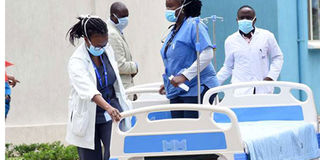Tackling the defining health crisis of our time

Workers at Kenyatta National Hospital on April 20, 2020 receive beds to help in the war on coronavirus. PHOTO | FILE | NATION MEDIA GROUP
What you need to know:
- Strong health systems are the best prevention not only against outbreaks and pandemics but also the multiple threats people face every day.
- History will judge us not only on whether we got through this pandemic but on the lessons we learned and the actions we took later.
From a cluster of cases of pneumonia of unknown cause in Wuhan, China, the novel coronavirus has spread with alarming speed, shaking the foundations of health systems, economies and societies around the world.
Five of the six most-affected countries by Covid-19 are in Europe. Yet Europe is playing a leading role in building global solidarity.
The European Union and WHO share a commitment to supporting the vulnerable. The disease knows no borders.
The EU and its member states’ Team Europe package, which is growing to be well over €23 billion (Sh2.7 trillion), will deliver parts of its response with the United Nations.
During a crisis, the most vulnerable suffer the most, and they must be our focus. The EU is supporting the WHO Strategic Preparedness and Response Plan with €30 million in new funding to strengthen emergency preparedness and response in countries with weak health systems or humanitarian crises.
The European Commission, WHO and partners from around the globe have also teamed up to launch ‘The Access to Covid-19 Tools Accelerator’ to speed up the development, production and equitable distribution of vaccines, diagnostics and therapeutics for Covid-19, so that all have equitable access to these lifesaving products.
The commission hosted a pledging event on May 4 at which more than 40 countries pledged €7.4 billion. But our partnership extends well beyond the current crisis.
HEALTH FINANCING
The pandemic exploits the gaps and inequalities in health systems, underscoring the importance of investing in health workers, health infrastructure and systems to prevent, detect and respond to disease outbreaks.
Strong health systems are the best prevention not only against outbreaks and pandemics but also the multiple threats people face every day.
And yet more than five billion people will lack access to essential health services by 2030 — including the ability to see a health worker, access to essential medicines, and running water in hospitals.
Even when services are available, using them can mean financial ruin for millions.
The EU has contributed €102 million to the Universal Health Coverage Partnership with WHO in 115 countries in Africa, the Caribbean, the Pacific, Eastern Europe and Central and South East Asia.
The world spends around $7.5 trillion (Sh801 quadrillion) on health each year — almost 10 per cent of global GDP.
But too many countries spend too much of their health budget on managing diseases in hospitals — where the costs are higher and the outcomes are often worse — instead of promoting health and preventing disease at the primary health care level.
ADEQUATE PREPARATION
Covid-19 will eventually recede but there can be no going back to business as usual. As we work on responding to this pandemic, we must also prepare for the next one.
Now is an opportunity to lay the foundations for resilient health systems around the world.
Investments to strengthen health infrastructure and workforce are the only way to avoid global health crises.
If we learn anything from Covid-19, it must be that investing in health now will save lives later.
History will judge us not only on whether we got through this pandemic but on the lessons we learned and the actions we took later.
Dr Ghebreyesus is the Director-General, World Health Organisation; Ms Urpilainen is the Commissioner for International Partnerships, European Commission.





